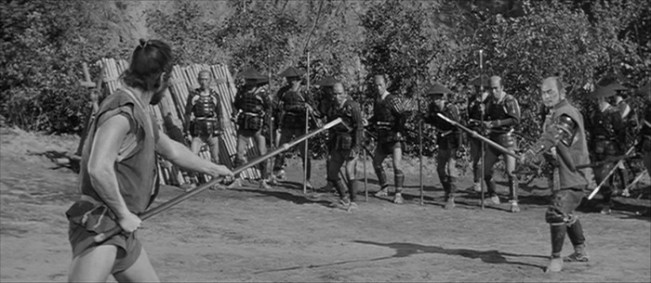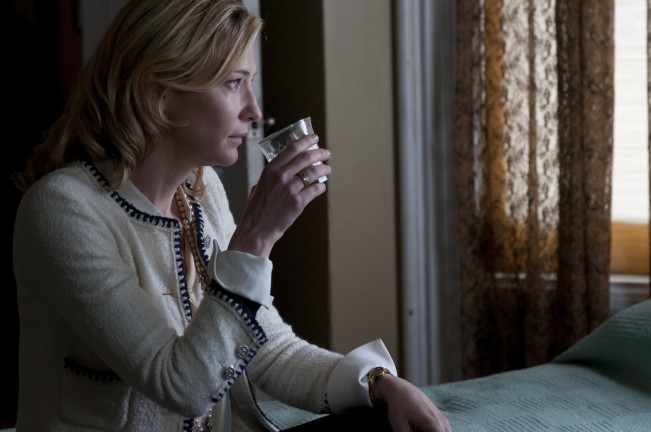

By Mike Wilmington Wilmington@moviecitynews.com
Wilmington on DVDs: The Hidden Fortress; Blue Jasmine; August: Osage County; Saving Mr. Banks
THE HIDDEN FORTRESS (Blu-ray) (Four Stars) Japan; Akira Kurosawa, 1958 (Criterion)
The great Akira Kurosawa action samurai epic, and one of Kurosawa’s most sheerly entertaining and thoroughly engaging films, this is the movie whose storm-the-fortress-and-save-the-princess plot helped inspire George Lucas’s smash hit space opera Star Wars — and whose two wandering peasant clowns (played by Minoru Chiaki and Kamatari Fujiwara) were Lucas’s inspiration for the bickering robots C-3PO and R2-D2.
One of the supreme adventure movies, with the inevitable Toshiro Mifune as the gruff warrior-general Makabe (one of his best roles), Takashi Shimura (the leader of the Seven Samurai) as the old general and Misa Uehara as Princess Yuki, the lady they’re all battling over. Like all the best Kurosawas — which encompasses most of his output — this is a beautifully crafted, tremendously exciting movie, and it features some of Kurosawa’s best action scenes, shot and cut in his characteristic vigorous three-camera set-ups. It’s better than Star Wars. (In Japanese, with English subtitles.) .
BLUE JASMINE (DVD; Blu-ray; Digital HD; UV) (Three and a Half Stars)
U.S.: Woody Allen, 2013 (Sony)
Blue Jasmine may not really be one of Woody Allen’s best films, as many are calling it. But it definitely contains one of the great actress performances in any of his picturess: Cate Blanchett’s heart-breaking portrayal of Jasmine French. Allen and Blanchett’s Jasmine is a razor-sharp look at a woman of style who seems solidly part of the American rich — but then loses everything. It’s one of the most memorable jobs ever by an Allen actress, on a level with Diane Keaton in Annie Hall and Manhattan, Mia Farrow in The Purple Rose of Cairo and Broadway Danny Rose, Dianne Wiest in Bullets Over Broadway, Judy Davis in Husbands and Wives and Penelope Cruz in Vicky Cristina Barcelona. Blanchett’s hungry eyes, and exaggerated elegance stick in your mind, gain depth and feeling as you watch her. Besides winning the Best Actress Oscar, the performance has been nearly universally praised, and it deserves to be.
Perhaps that’s because Jasmine as acharacter is a kind of culmination of Allen’s attitudes toward the moneyed white culture Jasmine represents. Jasmine lives what seems a charmed life as a member of the Manhattan financial social elite Allen loves to have fun with — but then finds herself hurled into the chaos of the 2008 financial collapse, and turning into Woody’s version of Blanche DuBois, Tennessee Williams’ lady on the edge, wandering, desperate, talking to herself, at the end of the line.
Is this a comedy or a drama? Actually it’s both. Much of the film is clearly intended (and works) as high dramatics, but the movie also draws from rich comedy wellsprings: swindles, self-deception and humbuggery. Here, these illusions destroy more than dignity, drive Allen’s characters into the stormy waters of Bergmanesque emotional trauma (in Interiors, Another Woman, or Match Point). Jasmine, whom Blanchett plays with a radiant selfishness and fragility, loses it (money, position, comfort) all, or most of it. She discovers that her life is a lie, and that her smoothie financier husband Hal (Alec Baldwin, dead-on slickly manipulative) is a liar, cheat and thief (both financial and romantic). She finds that her world was whirling on a Bernie Madoff-style ponzi pyramid of lies, and that she has few resources to cope with her present plunge to the Middle Depths.
When we first see Jasmine, she’s on a plane headed for San Francisco and a temporary refuge with her sister Ginger (Sally Hawkins, the breezy free spirit of Mike Leigh’s 2008 Happy-Go-Lucky), jabbering away about her life to her captive seatmate (Joy Carlin), who tells her husband later that Jasmine started off the conversation by talking to herself — which she does more and more these days. Soon, Jasmine has reached the Mission District where Ginger lives with her auto repair guy boyfriend, Chili (Bobby Cannavale) — which is where we get the first of many deliberate parallels to Williams’ great, sad, lyrical play A Streetcar Named Desire. Jasmine has arrived like Blanche DuBois at the New Orleans apartment of her sister Stella and of Blanche’s macho nemesis, Stella’s brutal hubby Stanley Kowalski — at a place which is her last stop, with a household where she’s partly welcome and partly resented and desired, and where her only hope of escape is Stanley‘s mama‘s boy bowling buddy Mitch..
Ginger is the Stella character, and Chili is Stanley — and so is Ginger’s ex-husband Augie (played surprisingly well by “hoodlum-of-humor” comedian Andrew Dice Clay). There are couple of possible Mitches, the most plausible of which is Peter Sarsgaard as Dwight, a State Department guy who sees Jasmine — or at least Jasmine in her dream world — as a fit wife for a man with political ambitions. Another more obnoxious maybe-Mitch is D. Fischler the horny dentist (Michael Stuhlbarg of the Coen Brothers’ A Serious Man), who employs her as a very nervous receptionist.
Jasmine is humiliated by Fischler’s attentions — and humiliated also by Ginger’s lower-class apartment and the crudity of Chili and his sports fan buddies. She does have her own Belle Reve memories though — and half the movie is taken up with flashbacks to Jasmine’s One Percenter life with Hal, and with the destruction of that dream, as she finally discovers everything he was — and everything his world was. At the end, Allen gives Blanchett the actress, a shattering moment — fittingly for an actress whose own stage performance of Blanche (under Liv Ullmann’s direction) was said to be phenomenal.
Allen is 77. This is his 44th movie. Why does the old stand-up guy turn his story into a grim parody of one of America‘s greatest saddest plays? Can we expect “Death of a Comedian” or “Long Deli’s Journey Into Knockwurst” or “Who’s Afraid of Sholem Aleichem?” or “12 Angry Yentas” somewhere down the line? Well, in fact parody, and putting himself into different worlds, is the Sid Caesarian soul of much of Allen’s comedy. He can be as much a parodist as his old Sid Caesar writer-colleague Mel Brooks — but where Brooks sends up Frankenstein and Star Wars, Allen has classier targets: Bergman, Fellini, film noir. Like Owen Wilson in Midnight in Paris, he likes to flee into other worlds, other times.
Woody twists some of the scenes: Augie and Chili are not such bad guys; Jasmine is less sympathetic than Blanche, and her strangers less kind. The real villain in Blue Jasmine is the economy itself, and its agents like Hal.
Blanchett is an amazing actress . Like Katharine Hepburn (whom she impersonated in The Aviator) or Meryl Streep (with whom she shares a sisterly resemblance), she is a player of tremendous vitality and depth, And brain power. Here, she often seems to be flirting with pathos, but she always slips the clinch — and dances away many times from the edge of humor, too. It’s a very intellectual performance, and the ending loops back to recall the beginning. Everything Blanchett does is transparent; like Jasmine — and like Blanche, we can see right though her. The rest of the actors, taking on literate, challenging Allen-scripted parts for scale (and obviously having a ball doing it) are wonderful. So is the mellow cinematography of Javier Aguirresrobe and the posh or more ordinary settings by Santo Loquasto. The music is more of the period jazz, blues and pop he loves to play or us, and that we should love to hear. I know I do.
No Extras.
August: Osage County (DYV; Blu-ray) (Three and a Half Stars)
U. S.: John Wells, 2013 (Anchor Bay)
A blisteringly good script by Tracy Letts — using the classic “Long Day’s Journey Into Night”/“Who’s Afraid if Virginia Woolf?” theatrical form of a loud, partly drunken gathering where secrets are revealed and wounds torn open. And with a super cast: Julia Roberts, Ewan McGregor, Juliette Lewis, Chris Cooper, Benedict Cumberbatch, Abigail Breslin, Dermot Mulroney, Margo Martindale and others.
The virtuoso center of the film however is (stop me if you’ve heard this one) Meryl Streep. In an uncharacteristically rowdy and foul-mouthed turn as Violet Weston, a nasty, drugged-out old pseudo-matriarch, celebrating her husband’s (Sam Shepard) passing by flaying alive her daughters and their men, Streep brings down the house, in more ways than one. It’s a classic scene-stealing performance by a lady who’s stolen many a scene before.
Saving Mr. Banks (Three Stars)
U.S.: John Lee Hancock, 2013 (Walt Disney)
Who would have thought that, nearly 40 years after the release of Walt Disney’s favorite creation, the bouncy Disney mass audience movie musical of P. L. Travers’ Mary Poppins, they’d make a Hollywood art movie and biopic on the making of Poppins, and that it would be graced by performances as rich and good as Tom Hanks’ gentle mogul Disney, Emma Thompson’s tart Britisher Travers, and Paul Giamatti’s good-guy turn as her driver. A nice show — and I mean that in a nice way.
Extras: Deleted scene.















